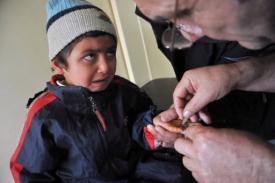Journalist and human rights activist Hossam Bahagat was prevented from travelling to Jordan, being informed at Cairo International airport that he had been placed on list of persons barred from international travel by the prosecutor-general.
Following media reports detailing the event, the Committee to Protect Journalists (CPJ) released a statement Wednesday condemning the travel.
The Egyptian state increasingly placed for human right activists on travel bans, unbeknownst to them. The practice has sparked outrage from civil society members, and local and international human rights defenders.
“Preventing Hossam Bahagat from travelling without justification is a violation of his rights, and has all the signs of an attempt to intimidate and silence him,” said CPJ Middle East and North Africa Programme Coordinator Sherif Mansour.
Mansour called on the Egyptian authorities to allow Bahgat and others to travel and to work without imposing restrictions upon them.
Bahagat announced Tuesday evening on his Facebook page that he was unable to travel to Jordan due to having been placed on a no-fly list by order of the prosecutor-general. No further details were available from authorities regarding the decision to prevent Bahagat from travelling.
Bahagat was travelling to Jordan to participate in a United Nations meeting on justice in the Arab world. He had been detained in November for four days by military prosecutors on charges of “publishing false news that threatened national security”.
Local and international human rights organisations reported that Egyptian authorities have increasingly imposed travel bans against civilians. In other cases, those barred from travelling have had their passports confiscated, according to CPJ’s statement.
Days before Bahagat’s case, National Council for Human Rights (NCHR) representative Nasser Amin was stopped at the airport by an immigration official who sent him to a low-ranking policeman to check if the lawyer was banned from travel.
However, after half an hour, the policeman returned Amin’s passport and allowed him to travel to Geneva.
A source in the airport said that Amin’s name was confused for another similar name, reported Al-Youm Sabea newspaper.
Similarly, director of the Arab Network of Human Rights and Information (ANHRI) Gamal Eid was barred from travelling on 4 February by a judicial order.
“I wasn’t given any reason as to why I am not allowed to travel. I went to the department responsible for this about six times for any information and they didn’t tell me anything. The last time I went an official told me a police officer took my file. When I went to the police officer he said he would not give me anything,” Eid told Daily News Egypt.
“I believe that order for travel bans are police violations; there is no evidence proving whether the order is decided by the prosecutor or by policemen,” he continued.
Earlier in February, twenty local human rights NGOs condemned the recent string of travel bans issued against a number of political activists and human rights defenders. “It seems the travel bans issued against many human rights defenders recently constitute an attempt to turn Egypt’s borders into a mass prison cell,” the statement read.
Eid further described travel bans orders as a confirmation that “Egypt is continuing to aspire to oppress freedoms.”
In mid-January, poet and activist Omar Hazek was also briefly banned from travel when he was departing for the Netherlands to receive an award celebrating freedom of speech.
Several others have also been barred from travel, including Mohamed Lotfy, the director of the Egyptian Commission for Rights and Freedoms (ECRF) barred in June 2015, and activist Esraa Abdel Fattah barred in January 2015. In December 2014, both directors of the Egyptian Democratic Institute, Hossam Al-Din Ali and Ahmed Ghoneim, were barred from travelling.
On 3 January, airport security officials banned the Egyptian-German researcher Atef Botros from entering Egypt and detained him overnight at the airport. Meanwhile, researcher and journalist Ismail Alexandrani was stopped at Cairo Airport on December 2015 and remains in detention.
“CPJ research shows record numbers of journalists in jail in Egypt. The country was second only to China for the number of journalists imprisoned when CPJ conducted its most recent annual global prison census on December 1,” the CPJ statement read.



